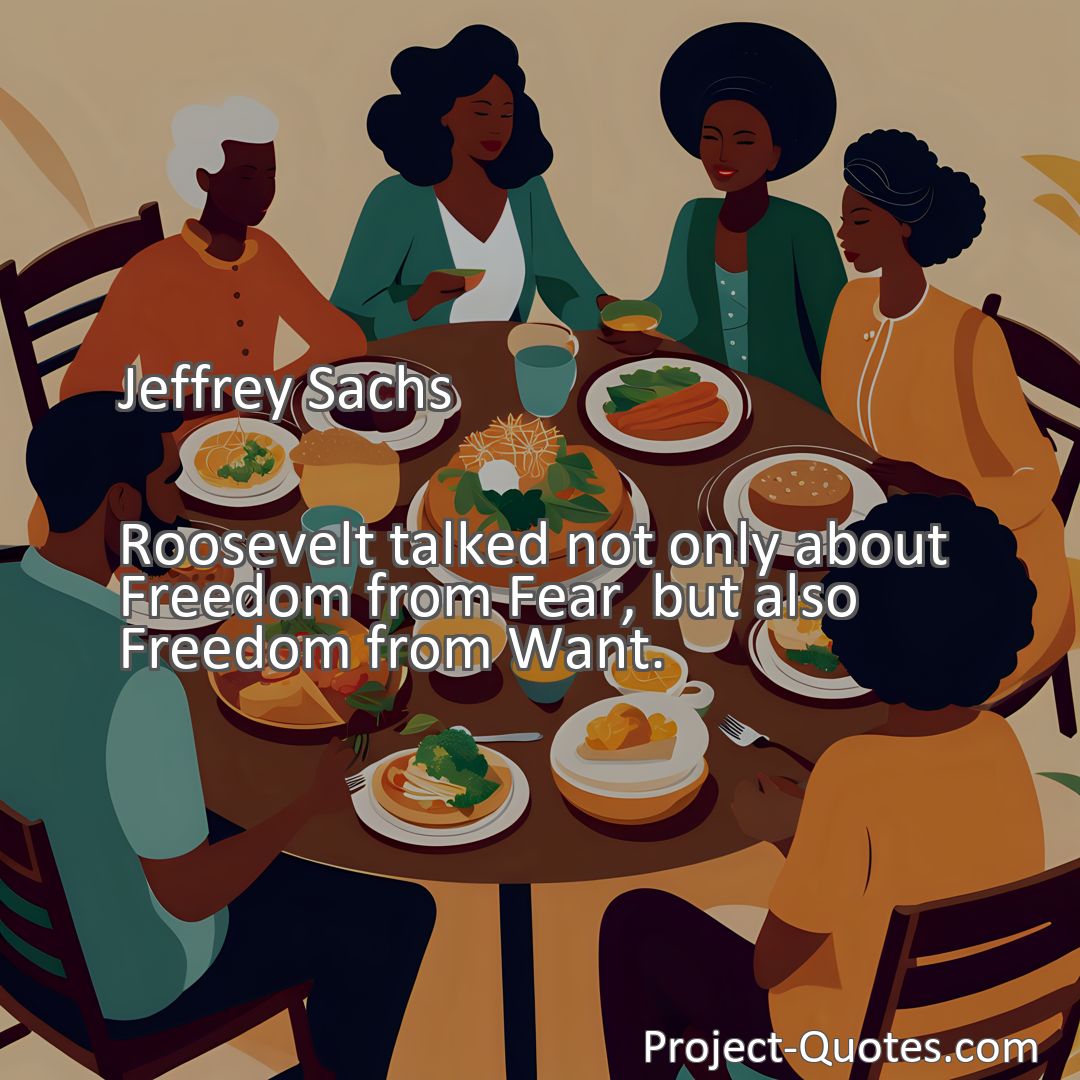Roosevelt talked not only about Freedom from Fear, but also Freedom from Want.
Jeffrey Sachs
Discover how Franklin D. Roosevelt’s initiatives aimed at freedom from fear and want transformed America. Learn about his New Deal programs and commitment to alleviating poverty and inequality for all.
Table of Contents
Meaning of Quote – Roosevelt talked not only about Freedom from Fear, but also Freedom from Want.
In the words of Jeffrey Sachs, “Roosevelt talked not only about Freedom from Fear but also Freedom from Want.” This powerful quote encapsulates the vision and values of Franklin D. Roosevelt, the 32nd President of the United States. Roosevelt’s presidency, spanning from 1933 to 1945, was marked by unprecedented challenges such as the Great Depression and World War II. However, his unwavering commitment to addressing the needs and concerns of everyday Americans set him apart as a transformative leader. Through his policies and speeches, Roosevelt emphasized the importance of ensuring freedom from both physical and economic insecurities.
One of the defining aspects of Roosevelt’s presidency was the New Deal, a set of programs implemented to recover and reform the country during the Great Depression. This initiative aimed to provide relief, recovery, and reform through measures such as the establishment of the Social Security system, the creation of job opportunities, and the regulation of financial institutions. By focusing on relief for those suffering from want and fear, Roosevelt sought not only to alleviate the immediate hardships but also to eradicate the underlying causes of such struggles.
Freedom from fear, as Roosevelt emphasized, was essential for individuals to live fulfilling lives. During the Great Depression, many Americans faced immense fear and uncertainty as they struggled to make ends meet. Job losses, foreclosures, and poverty became widespread, leaving countless families in dire circumstances. Roosevelt recognized that society could not truly be free if its members lived in constant fear of destitution or lack of basic necessities. By implementing measures to restore economic stability, he worked towards providing a sense of security and relief for the American people.
However, Roosevelt believed that freedom from want was equally important in ensuring a prosperous and fair society. Want, in this context, referred to the pervasive poverty and inequality that plagued the nation. Even before the Great Depression, income disparities and lack of access to basic resources were prevalent. Roosevelt recognized that achieving true freedom required addressing these systemic issues and giving every American the opportunity to lead a dignified life.
To combat this, Roosevelt introduced numerous initiatives aimed at eliminating want and creating a more equitable society. The establishment of Social Security, for instance, provided a safety net for elderly, unemployed, and disabled Americans, ensuring they had access to basic healthcare and support. Additionally, through the Works Progress Administration (WPA) and Civilian Conservation Corps (CCC), employment opportunities were created to alleviate the distress caused by high unemployment rates. These programs not only provided immediate relief but also contributed to long-term infrastructure development and conservation efforts.
Roosevelt’s commitment to freedom from want extended beyond the domestic front. His vision encompassed global concerns as well, believing that the United States had a responsibility to address poverty and inequality worldwide. In his famous Four Freedoms speech in 1941, Roosevelt identified freedom from want as one of the universal human rights that should be accessible to people around the globe. This speech laid the groundwork for the United Nations and its subsequent focus on poverty eradication and international development.
While Roosevelt’s efforts were commendable and undoubtedly made a significant impact, achieving true freedom from want and fear remains an ongoing challenge. In the present day, despite advances in technology and increased global interconnectedness, poverty and inequality persist. Nevertheless, Roosevelt’s legacy serves as a reminder of the importance of addressing economic disparities and promoting social welfare as crucial steps towards a more just society.
In conclusion, Jeffrey Sachs aptly captured the essence of Franklin D. Roosevelt’s vision with the quote, “Roosevelt talked not only about Freedom from Fear but also Freedom from Want.” Through his policies and speeches, Roosevelt sought to ensure that every American had the opportunity to live a life free from fear and want. His focus on providing relief, recovery, and reform during the Great Depression and World War II laid the foundation for a more equitable society. Although challenges persist in the fight against poverty and inequality, Roosevelt’s legacy continues to inspire and remind us of the ongoing importance of pursuing freedom from both fear and want for all.
I hope this quote inspired image brings you hope and peace. Share it with someone who needs it today!


